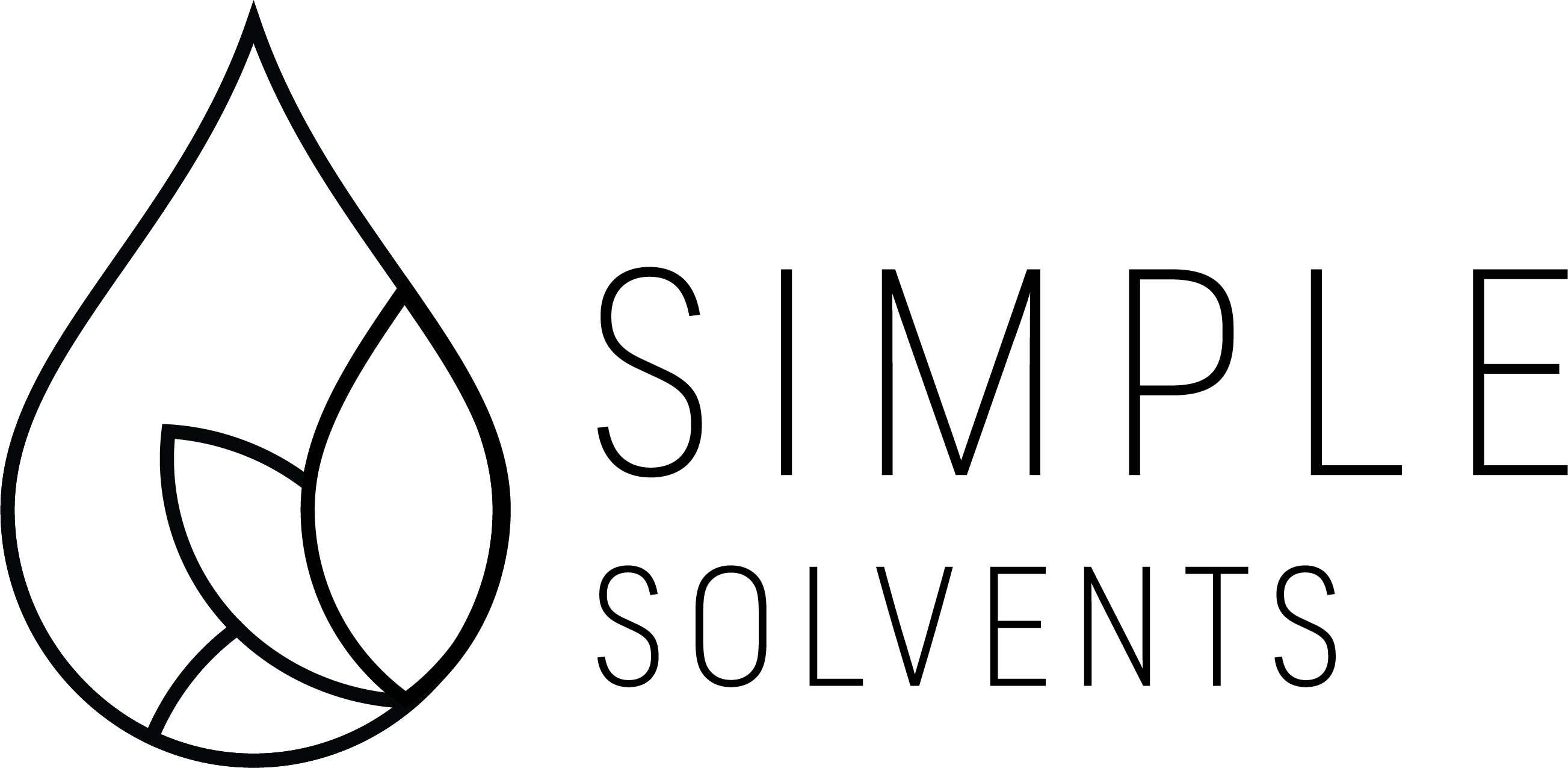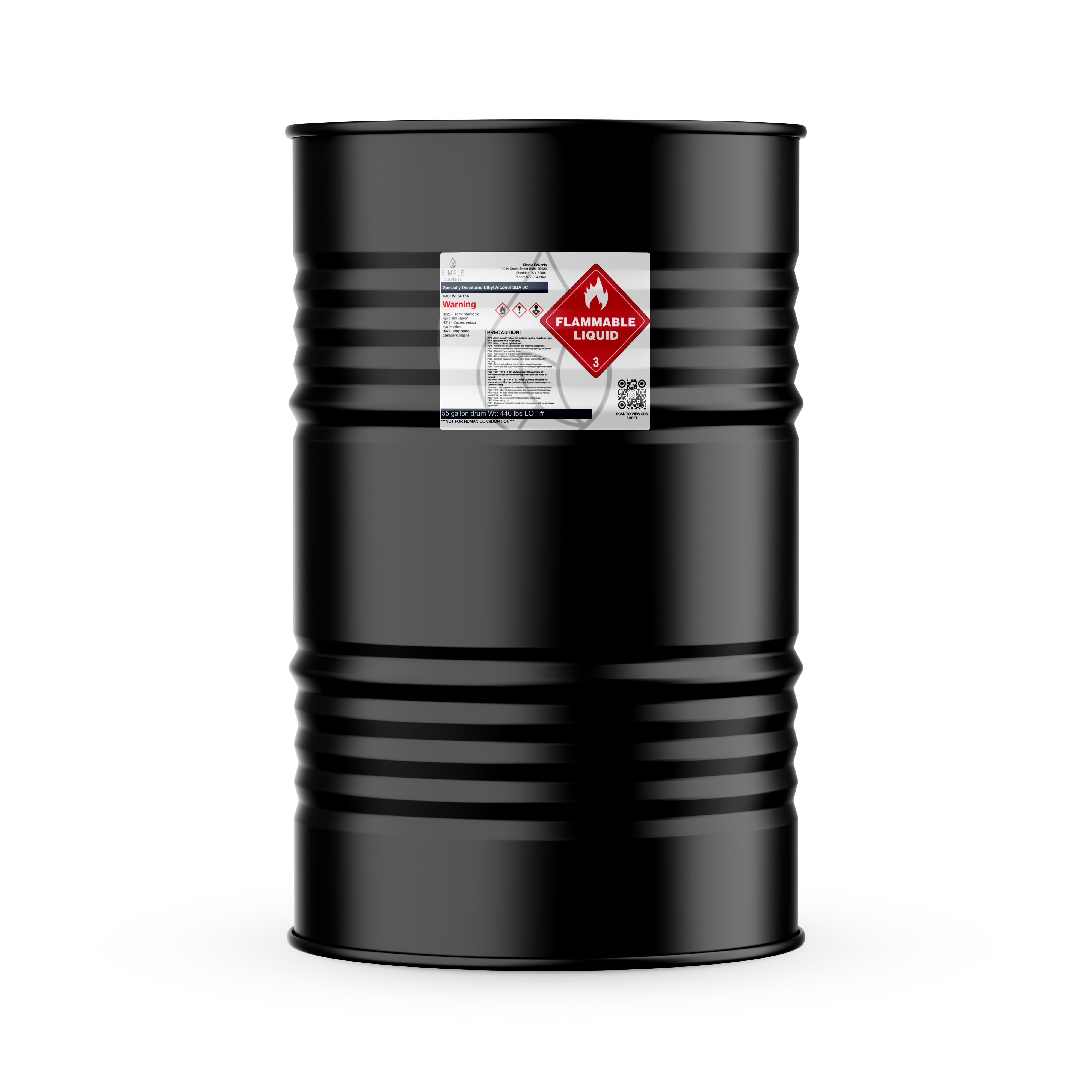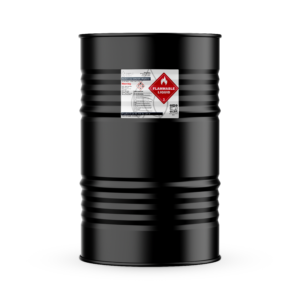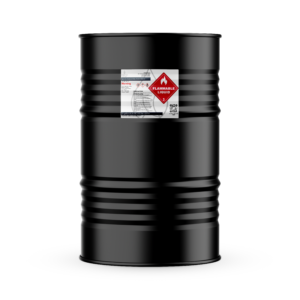Specially Denatured Alcohol SDA 3C
Specially Denatured Alcohol SDA 3C. Ethanol Denatured with Isopropanol.
Industrial alcohol user / seller permit required to purchase.
$620.00 – $2,250.00Price range: $620.00 through $2,250.00
Bulk pricing & price matching available
Lab Tested
Secure Payments
Quality Guarantee
Fast Delivery
Specially Denatured Alcohol 3C – SDA 3C
Specially Denatured Alcohol (SDA) 3C is a versatile and highly effective solvent designed for a range of industrial and commercial applications. With its unique formulation, SDA3C combines the purity of ethanol with added denaturants to prevent misuse while providing excellent solvent properties. This makes it ideal for use in fragrance manufacturing, cleaning and sanitization, and various other applications. SDA3C is suitable for large-scale operations and ensures high performance and reliability across diverse industries.
Industries
- Fragrance: SDA 3C is widely used in the fragrance industry for blending and diluting aromatic compounds. Its effective solubility ensures that fragrances and essential oils are mixed uniformly, contributing to high-quality perfumes and colognes.
- Cleaning & Sanitization: In the cleaning and sanitization sector, SDA-3C is an effective solvent for manufacturing disinfectants and sanitizers. Its ability to dissolve a wide range of contaminants makes it ideal for producing cleaning products with strong antimicrobial properties.
- Cultivation: SDA-3C keeps your facility sanitized, degreased, and disinfected. SDA 3C can directly replace Isopropyl Alcohol in many cultavation uses.
- Environmental: Used in environmental applications, SDA-3C is effective for analyzing and extracting organic pollutants from soil and water samples. Its high purity ensures accurate results in environmental testing.
- Government: In government and regulatory settings, SDA-3C is used for various applications requiring a reliable and effective solvent. Its formulation meets the standards necessary for compliance and safety.
- Healthcare: In the healthcare industry, the blend is utilized in the production of antiseptics and other medical solutions. Its ability to act as a solvent ensures the effective formulation of healthcare products.
- Laboratory: 3C is a valuable solvent in laboratory settings for sample preparation and various chemical processes. Its purity and effectiveness contribute to accurate and reliable research results.
- Skincare & Cosmetics: Used in the skincare and cosmetics industry, SDA 3C acts as a solvent in the formulation of lotions, creams, and other personal care products. Its properties ensure the even mixing of ingredients for superior product quality.
- Pharmaceuticals: 3C supports pharmaceutical production by providing a reliable solvent for extracting and processing active ingredients. Its formulation meets industry standards for pharmaceutical applications.
- Water Treatment: In water treatment processes, it is used for extracting contaminants and purifying water. Its solvent properties contribute to effective water treatment solutions.
Uses
- Fragrance Manufacturing: It is used to blend and dilute fragrance oils, ensuring a consistent and high-quality final product in perfumes and colognes. It can sometimes be known as perfumers alcohol.
- Disinfectant & Sanitizer Manufacturing: It is a key ingredient in the production of disinfectants and sanitizers, providing effective dissolution of active antimicrobial agents.
- Cleaning & Degreasing: It is effective for cleaning and degreasing industrial equipment and surfaces, removing oils and residues with ease.
- Electronics Cleaning: It is used to clean delicate electronic components, including circuit boards and computer chips, ensuring the removal of contaminants without damage.
- Environmental Testing: Used for extracting organic pollutants from soil and water samples, 3C provides accurate results in environmental analysis.
- Pharmaceutical Production: It supports the extraction and processing of active pharmaceutical ingredients, contributing to the quality and efficacy of medications.
- Skincare & Cosmetics: S.D.A.3C is utilized in formulating skincare and cosmetic products, ensuring even mixing and effectiveness of active ingredients.
- Laboratory Processes: It serves as a solvent in various laboratory processes, including sample preparation and chemical reactions, ensuring reliable results.
- Water Treatment: SDA 3C is used in water treatment to extract contaminants and purify water, contributing to clean and safe water for various uses.
Replacement for Pure Isopropyl Alcohol
SDA 3C offers a compelling alternative to pure isopropyl alcohol in many scenarios. Its eco-friendly formulation, which includes ethyl alcohol derived from corn and only a small amount of isopropyl alcohol, results in a product that is both effective and sustainable. With a more neutral odor compared to pure isopropyl alcohol, SDA 3C often provides a less intrusive smell, making it a preferred choice for applications requiring minimal odor. Additionally, SDA 3C can be used as rubbing alcohol, offering similar functionality to isopropyl alcohol while being more environmentally conscious.
Formula No. 3-C CFR 21.37
100 gallons of 200 proof ethyl alcohol denatured with 5 gallons of isopropanol.
Product Information
- CAS Number: Ethanol 64-17-5, Isopropanol 67-63-0
- Common Names: Specially Denatured Alcohol 3C, SDA 3C, Denatured Ethanol, Denatured Alcohol, SDA3C, S.D.A. 3C, SDA-3C, ethanol sda 3c 200 pf, sda 3c ethanol 200 proof, alcohol sda 3c 200 proof, 200 proof specially denatured alcohol 3c
- Scientific Names: Ethanol (denatured), Ethyl Alcohol (denatured), Denatured Alcohol
Disclaimer for Purchasing Specially Denatured Alcohol
Important Notice:
Before purchasing specially denatured alcohol from Simple Solvents, please be aware of the following:
Industrial Alcohol User / Seller Permit Required
You must possess an industrial alcohol user permit or industrial alcohol sellers permit to purchase Simple Solvents Specially Denatured Alcohol products.
Users: The delivery address must match the address on the permit.
Resellers: The delivery address for stocking orders must match the address on the permit. We require a copy of your end customer’s permit for all sales shipping directly to an end user.
Please submit your permit within 48 hours of your order. We will cancel any orders that do not have the proper paperwork.
To learn more about specially denatured alcohol, visit the TTB website.
Age Verification 21+
All buyers must be 21 years of age or older. Deliveries will only be made to recipients who can provide a verified signature to confirm age at the time of delivery.
Approved Uses
As a solvent:
011. Cellulose coatings.
012. Synthetic resin coatings.
016. Other coatings.
021. Cellulose plastics.
022. Non-cellulose plastics, including resins.
031. Photographic film and emulsions.
032. Transparent sheeting.
033. Explosives.
034. Cellulose intermediates and industrial collodions.
035. Soldering flux.
036. Adhesives and binders.
043. Solvents, special (restricted sale).
051. Polishes.
052. Inks (including meat branding inks).
053. Stains (wood, etc.).
141. Shampoos.
142. Soaps and bath preparations.
311. Cellulose compounds (dehydration).
312. Sodium hydrosulfite (dehydration).
315. Other dehydration products.
320. Petroleum products.
331. Processing pectin.
332. Processing other food products.
341. Processing crude drugs.
342. Processing glandular products, vitamins, hormones, and yeasts.
343. Processing antibiotics and vaccines.
344. Processing medicinal chemicals (including alkaloids).
345. Processing blood and blood products.
349. Miscellaneous drug processing (including manufacture of pills).
351. Processing dyes and intermediates.
352. Processing perfume materials and fixatives.
353. Processing photographic chemicals.
354. Processing rosin.
355. Processing rubber (latex).
358. Processing other chemicals.
359. Processing miscellaneous products.
410. Disinfectants, insecticides, fungicides, and other biocides.
420. Embalming fluids and related products.
430. Sterilizing and preserving solutions.
440. Industrial detergents and soaps.
450. Cleaning solutions (including household detergents).
470. Theater sprays, incense, and room deodorants.
481. Photoengraving and rotogravure dyes and solutions.
482. Other dye solutions.
485. Miscellaneous solutions (including duplicating fluids).
As a raw material:
530. Ethylamines.
540. Dyes and intermediates.
575. Drugs and medicinal chemicals.
576. Organo-silicone products.
579. Other chemicals.
590. Synthetic resins.
As a fuel:
611. Automobile and supplementary fuels.
612. Airplane and supplementary fuels.
613. Rocket and jet fuels.
620. Proprietary heating fuels.
630. Other fuel uses.
As a fluid:
710. Scientific instruments.
720. Brake fluids.
730. Cutting oils.
740. Refrigerating uses.
750. Other fluid uses.
(5) Miscellaneous uses:
810. General laboratory and experimental use (own use only).
811. Laboratory reagents for sale.
812. Product development and pilot plant uses (own use only).
900. Specialized uses (unclassified).
Unapproved Uses
Conditions governing use.
This formula shall not be used in manufacturing Reagent alcohol general-use formula under § 20.117.
When dealing with class 3 hazardous materials like certain solvents, it's crucial to prioritize safety at every step, from purchasing to shipping and receiving. At Simple Solvents, we take care of all aspects of delivery, ensuring that our customers receive their products safely and in compliance with regulations. Here are some essential safety precautions and information needed for handling these materials responsibly:
Safety Data Sheets (SDS): Customers can access Safety Data Sheets (SDS) for all our products, which provide essential information about the chemicals, including hazards, handling procedures, and emergency measures.
Understanding Hazards: While we handle the hazardous materials, it's important for customers to understand the specific hazards of the products they are purchasing, such as flammability or reactivity, and how to mitigate them in case of emergencies. Always read the safety data sheet before buying, using, storing and disposing chemicals.
Transportation Compliance: Our operations adhere to the Department of Transportation (DOT) regulations for shipping hazmats. Be sure to communicate with your local authorities regarding permits and regulations for buying, storing, using, and disposing of chemicals.
Proper Packaging: We use approved containers, labeling, and packaging materials to prevent leaks, spills, or accidents during transit, ensuring that hazardous materials are delivered safely.
Storage Considerations: Always store hazardous materials in designated areas with proper ventilation, temperature controls, and secondary containment measures to prevent accidents and minimize risks during transportation / storage.
Disposal Procedures: Be sure to understand proper disposal procedures and regulations that are unique to your location.
Emergency Response Plan: Always be equipped with a comprehensive emergency response plan, including procedures for spills, leaks, fires, and injuries related to hazardous materials, to ensure swift and effective response in case of emergencies.
Continuous Monitoring: Regularly monitor and inspect your storage areas, equipment, and handling practices to identify and address potential safety hazards promptly.
- solvent supply made easy
Material Safety Best Practices
When purchasing, using, shipping, storing, or disposing of Simple Solvents’ products, including flammable liquids and solvents, please be aware of the following important considerations and best practices:
Some Simple Solvents products are class 3 hazardous materials and are highly flammable. They may pose significant risks if not handled correctly. Always use these materials in well-ventilated areas away from heat sources, sparks, or open flames. Wear appropriate personal protective equipment (PPE), including gloves and safety goggles, to minimize exposure.
Proper Handling
Exercise caution when handling to prevent spills, leaks, or accidents. Use spill containment measures and follow the safety data sheet for safe handling. Do not tip packaging during transit or storage – keep the product vertical at all times.
Shipping and Storage
Ensure compliance with Department of Transportation (DOT) regulations for the shipping. All shipments must be made to a commercial address with proper labeling and documentation. Store these materials in secure, cool, and dry conditions away from incompatible substances. If the product is hazardous as indicated on the SDS, consult with your local fire marshal regarding storage allowances and local restrictions to ensure compliance with regional safety regulations.
Disposal
Follow local, state, and federal regulations for the disposal of chemical materials. Properly dispose of unused or expired products through certified disposal facilities or programs. Do not dispose in regular trash or down drains.
Emergency Procedures
In case of an emergency, such as a spill, leak, or exposure, immediately follow the appropriate emergency response protocols. Evacuate the area if necessary and contact emergency services for assistance. Use spill containment kits to manage and contain leaks, and refer to the Safety Data Sheet (SDS) for specific first aid measures and response instructions.
Regulatory Compliance
Familiarize yourself with relevant regulations and safety data sheets (SDS) for the materials you are handling. Ensure adherence to all legal and safety requirements to protect yourself and others. Every state and locality may have additional rules & regulations.
By following these guidelines, you can help ensure the safe and responsible use of Simple Solvents products. Always prioritize safety, emergency preparedness, and regulatory compliance in all aspects of handling and disposal.
Recommended Products
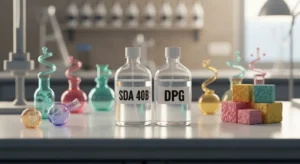
SDA 40B & DPG: Essential Ingredients in Fragrance Formulation
Behind every beautifully crafted perfume, cologne, or room spray lies a complex blend of science and artistry. While fragrance oils

Perfumer’s Alcohol: Uses in Perfumes, Colognes & Room Sprays
Perfume and fragrance creation is both an art and a science. Behind every bottle of perfume, cologne, or room spray
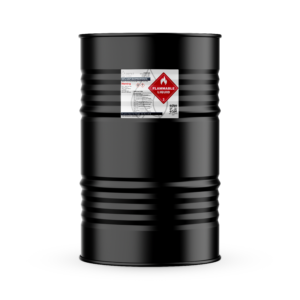
Isopropyl Alcohol Uses
Isopropyl Alcohol Uses by Different Industries Isopropyl Alcohol (IPA) is a versatile chemical with various uses across various industries. It

All You Need to Know About Ethanol and Its Various Uses
All You Need to Know About Ethanol and Its Various Uses Ethanol and Its Various Uses in fuels are essential

The Power of Ethanol: Fun Ethanol Facts on Safety and Industry
The Power of Ethanol: Ethanol Facts on Safety and Industry We are going to go over ethanol facts, uses and

Shipping Dangerous Goods: Regulations and Precautions
Shipping Dangerous Goods: Regulations and Precautions Shipping dangerous goods can be a tricky and sensitive process. It is crucial to
